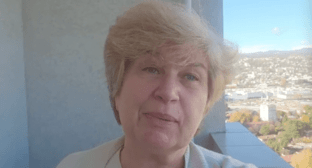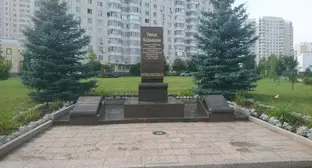03 August 2009, 21:00
In South Ossetia, activist of People's Party states her political persecution
The Prosecutor's Office of South Ossetia has handed over to the court the case of Fatima Margieva, activist of the People's Party, a teacher of history at the local state university, who is accused of illegal arm storage. However, as Ms Margieva told the Iron Тimes in her interview, she believes that she is pursued for her political activities.
Let us remind you that on May 27 Alan Tskhurbaev, author of the blog "Ossetia and around: view from within" at the "Caucasian Knot", reported that the Tskhinvali apartment of Fatima Margieva, a member of the oppositional People's Party, headed by Roland Kelekhsaev, was searched by South-Ossetian KGB agents. On May 28, Margieva, detained after the search in her house, was released under recognizance not to leave. As she said, she was searched after someone's denunciation that she had allegedly disseminated leaflets calling to boycott the parliamentary elections.
"I ran for parliament from the People's Party, but all its candidates were crossed out. The new People's Party was founded. And under its lists those people who had never been its members became deputies. I'm in fact the only one who remained in Tskhinvali. All the others have left. But I work here, I have my children and my house here, and I have no other place to live in, except for as here. And here I've become an object of persecutions," the "Rosbalt" quotes Ms Margieva.
"A couple of days before the elections, on May 27, a car drove up to my house, and I was told that under the operative information my house should be examined. And I had to let them in. They looked for leaflets: allegedly, leaflets were spread around calling to boycott the elections. Naturally, they found nothing: I had no leaflets whatsoever. But they found arms," said the teacher.
According to Margieva, during the search in her house they found one pistol, a manual anti-tank grenade launcher and one automatic gun, a plenty of cartridges, detonators, a grenade and many ordnances to them.
Margieva does not deny the weapons. As she said, they were bought in early 1990s, "when it became clear that the war was unavoidable, and everyone in the city began arming up."
She said that in South Ossetia "nobody hands over the weapons even now, after announcement that arms should be given away" and explained: "Firstly, the borders have not been defined yet, provocations continue, and we don't feel safe yet. Secondly, now they offer to give out the weapons that people had bought by themselves, sometimes for their last money, without any compensation, just free of charge. And, at last, the main point: during the war the country leaders behaved in such manner that people understood - one should hope for him- or herself, not for the authority."
Fatima Margieva is sure that in her case the law was applied selectively. "A criminal case was initiated against me, but the situation in the city is such that practically every house has arms," she has concluded.




